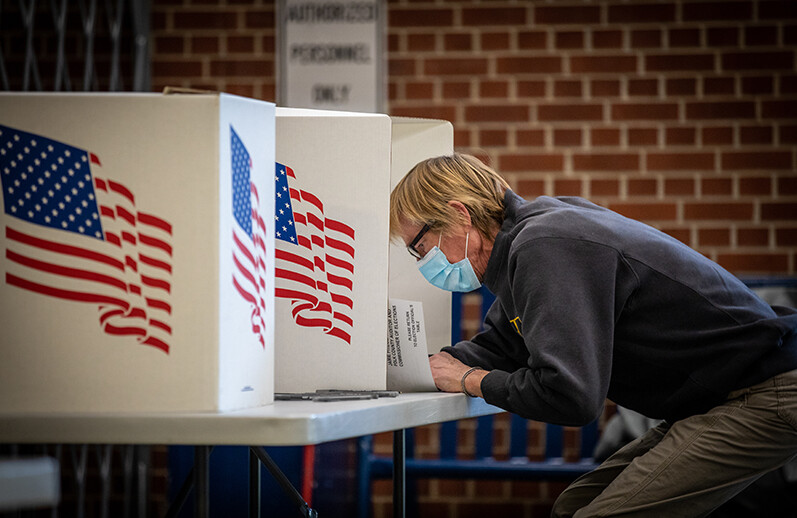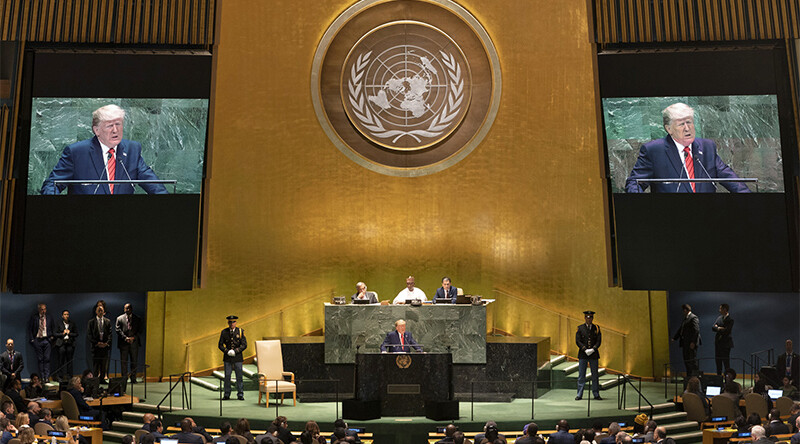KEY FINDINGS
Based on two surveys taken in 2020 of engaged & intellectually curious citizens interested in international affairs, conducted by the U.S. Global Engagement (USGE) project of Carnegie Council for Ethics in International Affairs:
- Isolationism from world affairs is rejected by an absolute majority of the respondents.
- Respondents want the U.S. to play an active leadership role in international relations but do not want the U.S. to make overproportionate contributions.
- The U.S. should be able to find compromise approaches with other countries in pursuing solutions to global problems rather than taking a unilateral stance.
- More than three-quarters of respondents believe that the U.S. over-relies on the military instrument of power.
- Opinion is divided as to whether the international system is cooperative or competitive.
- There is strong support in favor of the democratic community narrative, within limits.
- Respondents support a partial decoupling from China and a reorientation towards other democracies but also want to find a way to work constructively with China on global issues.
- Respondents largely agree that American values should play a role in determining foreign policy but not necessarily be the central organizing principle.
- Respondents are aware of the problem of balancing foreign policy obligations with domestic considerations but do not support a blatantly transactional "America First" approach.
- The survey results largely confirm earlier findings of the study and focus groups held by USGE in 2018 and 2019.
THREE TAKEAWAYS
- Voters interested in international affairs prefer a U.S. global engagement approach that embraces a "democratic community" where the U.S. builds collaborative partnerships with other democratic states.
- Voters interested in international affairs are focused on improving U.S.-China relations but want to avoid overdependence on China for critical goods and services.
- Equity is an important consideration for these voters, where the U.S. works with other nations to solve pressing challenges such as climate change, the outbreak of pandemics, and building a more open global system, where U.S. contributions and leadership are balanced with what other countries can and should bring to the table.
BACKGROUND ON THE 2020 SURVEYS
The foreign policy narratives project of Carnegie Council's U.S. Global Engagement program was launched in 2018. An initial report was released in December 2018, Misconnecting with the U.S. Public: Narrative Collapse and U.S. Foreign Policy, which diagnosed the causes and symptoms of the narrative collapse of the bipartisan consensus in U.S. foreign policy during the 2016 elections. It drew the following conclusions:
- Americans want to amend, not end, their involvement in global affairs.
- They want to renegotiate some of the terms of American involvement pertaining to costs and burden-sharing.
- They want to revisit the question of how costs and benefits of U.S. engagement will be distributed among the population.
- They want a balanced approach that navigates between the extremes of isolationism and declaring that 160+ countries in the world are equally vital to U.S. national interests.
- They want to see a national security community that has the ability to set limits and say "no" and to cut losses and move on.
The second report, issued in October 2019, summarized the conclusions drawn from the focus groups, meetings, and study group sessions held by the U.S. Global Engagement project during 2018 and 2019. The Search for a New Narrative: Recasting American Involvement in the International System offered a set of possible narratives for reframing U.S. involvement in international affairs. This report identified the following broad approaches to conceptualizing U.S. foreign policy:
- Chastened Restorationist: a return to the broad sweep of U.S. forward engagement that defined American policy pre-2016, on the assumption that U.S. investment and "heavy lifting" in maintaining the current order, even if it imposes short-term, upfront costs, is vital to making Americans safer, more secure, and prosperous.
- Transactional Internationalism: shifting the basis of U.S. engagement by defining a series of quid pro quos for U.S. involvement, where American aid or action offered to others is expected to be compensated.
- Democratic Community: the U.S. should pivot and reorient its core economic and security relationships to encompass a community of like-minded democracies in Europe and Asia (and perhaps Latin America and Africa). This would not only promote the development of norms (and withstand efforts by China, Russia, and others to revise the core tenets of the current international system) but would seek to re-incentivize support for a democratic coalition of nations by reorienting trading relations so that democracies trade and invest with each other, rather than "yoking" their economies to a Chinese system that may promise cheaper goods and easy credit, but which does not support the security goals or value propositions of the democracies.
- Retrenchment: the U.S. would focus on an immediate core of nations but limit its involvement elsewhere to immediate, pressing existential threats.
- Reindustrialization and Regeneration: the U.S. should take a pause and re-evaluate its global posture. Its focus is on rebuilding America's core economic might rather than risk the continued hollowing out of the U.S. in a vain attempt to continue to be the primary source of global public goods.
- Climate Change: changes expected in the global climate will require re-conceptualizing global affairs and the U.S. role in it, and to mitigate the problems that climate shifts are expected to cause, concerted action among countries to find and implement solutions is required.
This third report, The Public Responds: Contributing to a New Narrative on the Future of U.S. Global Engagement, is based on a series of polls conducted by the U.S. Global Engagement project to obtain feedback from what might be described as U.S. voters interested in international affairs, people who have participated in Carnegie Council events and discussions and who see themselves as taking part in civil society and consider themselves interested in foreign relations, but who are not themselves part of the extended U.S. foreign policy community. Many of the people who responded to both polls tended to be people involved in chapters of the World Affairs Council or the American Committees on Foreign Relations.1
In particular, these polls allowed the U.S. Global Engagement project to take the temperature of its audiences from Carnegie Council events in New York and around the country, and to develop a snapshot of how Americans "outside the beltway" conceptualize the U.S. role in the world and how they assign priorities among competing clusters of interests and values.
SURVEY RESULTS
First, a key driver for people's interest in the U.S. taking an active role in world affairs arises out of their sense of growing insecurity. Nearly half of the respondents believe that the world has become more dangerous during their lifetimes, with a little over a third taking the opposite tack, that the world has become safer. Almost 8 in 10, however, believe that the United States will face a major cataclysm in the next two decades. And a majority are not sure that the international community will work together to solve pressing global problems. Respondents were split on the question of whether the default setting for world affairs was competition, cooperation, or confrontation. Only about 11 percent saw confrontation as the norm, but there was an even split between viewing the international system as competitive versus cooperative.
Given this split perspective, it is not surprising that the democratic community narrative would find wide-ranging support—about two-thirds of respondents indicated agreement with the proposition that the United States should partner primarily with other democracies. This narrative posits that cooperation is possible and desirable amongst a group of like-minded countries—and that this cooperation can be mutually beneficial and reinforcing, while also creating a bloc of states that can assist in blunting the competitive edges of other states like China.
When looking at the global order, the trading order, and economic relations, around 43 percent indicated that the United States should be trading primarily with allies, with another 51 percent saying that this should be a consideration in how we frame our economic relations. Nearly 8 in 10 respondents agreed with the proposition that democratic states make more reliable trading partners and allies, and 71 percent agreed that the United States should source important goods and services from other democracies. Most respondents agreed that making progress on democratic and human rights standards should be a condition for U.S. assistance. Only a fraction suggested that the United States automatically support another democracy when it is engaged in a dispute with a non-democracy (approximately 32 percent), but 60 percent said it should depend on the situation. At the same time, most respondents were not eager to divide the world up into hostile blocs or forego effective cooperation, even across geopolitical and ideological lines. When asked whether they would "prioritize pushing for democratic change over securing workable agreements on trade and dealing with climate change" in terms of framing U.S.-China relations, over 61 percent of respondents rejected that approach, while only 29 percent were in favor.
Overall, nearly 8 in 10 respondents were comfortable with finding compromise solutions with other states to secure wide-ranging and effective cooperation in coping with global issues—and also as a way to ensure a more equitable sharing of the burden. This suggests that the respondents are prepared to give up some of America's freedom of action in setting the agenda in return for other countries shouldering more of the costs.
UNDERSTANDING TRADE-OFFS
Moving beyond generalities, respondents were asked to make "hard choices" between competing sets of values and interests. When asked the question as to whether the U.S. should intervene in Syria in order to deal with the humanitarian crisis, even at the risk of costs and casualties for the United States, only 44 percent indicated firm support for that option. The remaining answers were split between a definitive "no" or being unsure whether to support that option. When asked about a peace deal in Afghanistan with the Taliban that would address security concerns about terrorism but that would not secure equal rights for women, 41 percent would support, 31 percent would oppose, and the remainder were unsure.
Given concerns about Saudi Arabia's human rights records and other issues, more than 80 percent of respondents signaled a willingness to pay higher energy prices in order to lessen dependence on Riyadh. A broader question about energy purchases from other authoritarian states also yielded a similar result. On a related subject, nearly 7 in 10 agreed with the statement, "Would you as a consumer be willing to pay up to 20 percent more for a good or service that you consume if that was to purchase it from another democracy instead of a cheaper alternative from a non-democracy, particularly if it has human rights problems?" and nearly 85 percent of respondents indicated that they try not to purchase goods and services sourced from countries with limited protections for labor and the environment.
IMPLICATIONS FOR THE DEMOCRATIC COMMUNITY NARRATIVE AND U.S. FOREIGN POLICY IN THE 2020s
Ash Jain, who oversees the Atlantic Council's Democratic Order Initiative and D-10 Strategy Forum, made the case for the democratic community approach in an October 2020 presentation to the U.S. Global Engagement project, noting:
"It's important to engage not just because there are threats that we need to deal with but because it's in our interest to find other nations, to work with other nations to solve some of the challenges that we are trying to face which we know in a globalized world we can't do by ourselves—whether it's the pandemic and the scourge of the coronavirus that we are all suffering through today, whether it's terrorism as we have seen over the years, nuclear proliferation, climate change, or building an open global economy. Those are important ways that affect Americans in their everyday lives, in which we cannot succeed if we are not working more closely with allies and if we don't have a grouping of partners who can help us achieve the goals that we are seeking. We may be a superpower, but we are not omnipotent, and we can't succeed if we're by ourselves."
The survey data indicates that, at this moment in time, such an approach would find support among the voters. A majority of the engaged voters surveyed support the idea of the U.S. reorienting its core trading relations with a community of like-minded democracies in Europe and Asia (and perhaps Latin America and Africa), rather than "yoking" their economies to a Chinese system that may promise cheaper goods and easy credit, but which does not support the security goals or value propositions of the democracies. Moreover, they indicate a willingness to pay for this viewpoint with their wallets.
However, they do not support an overly confrontational approach to China nor wish to preclude the prospect of beneficial cooperation with Beijing in tackling transnational challenges.
This suggests that citizens interested in international affairs may welcome a foreign policy approach that prioritizes the consolidation of America's relationships with fellow democracies to promote both cooperation and more equitable burden sharing but does not seek open confrontation with China. Articulating a rationale for U.S. global engagement along these lines could generate a new domestic consensus for U.S. involvement in world affairs.
1 These surveys are not "scientific" in the sense that they attempt to accurately duplicate a cross-section of the U.S. population. The approximately 500 respondents comprise representatives from all over the country, from different professional and occupational spheres, and across educational, generational, and gender cohorts—but the respondents self-selected to respond to the surveys.




